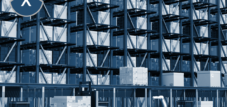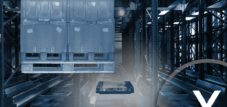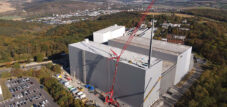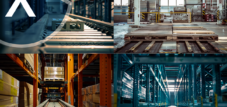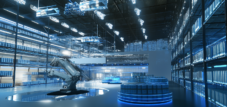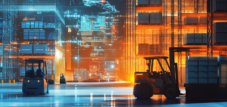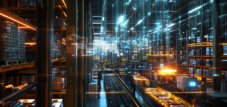22,000 pallets, 0 employees – From shelf to truck without handling: The secret of the German super warehouses
Xpert pre-release
Language selection 📢
Published on: September 3, 2025 / Updated on: September 3, 2025 – Author: Konrad Wolfenstein

22,000 pallets, 0 employees – From shelf to truck without handling: The secret of German super warehouses – Creative image: Xpert.Digital
Costs down, speed up: Why everyone is now investing in fully automated warehouses
What is meant by full automation in high-bay warehouses?
Full automation in high-bay warehouses refers to a system in which almost all storage and logistics processes run without direct manual intervention. This technology is particularly widespread in Germany among large industrial companies. Companies like Henkel, for example, have commissioned a fully automated high-bay warehouse at their Wassertrüdingen site. It has a floor space of 4,000 square meters and can accommodate 22,000 pallets and store and retrieve up to 250 pallets per hour.
A fully automated facility typically consists of three main components: stacker cranes, automated guided vehicles, and intelligent warehouse management software. These systems work together in a coordinated manner to ensure efficient and error-free material handling. For example, Sofidel in the USA has implemented an automated warehouse with 35,000 storage locations, equipped with five stacker cranes and double-mover shuttles capable of simultaneously moving two pallets weighing up to 750 kilograms.
The concept of full automation enables companies to significantly increase their storage capacity while simultaneously reducing operating costs. For example, Gealan built a fully automated high-bay warehouse measuring 125 meters long, 26 meters high, and 22 meters wide, offering 5,020 storage locations and achieving a capacity of up to 70 cassette changes per hour.
Suitable for:
- Space and cost savings with ASRS as optimized logistics and how it transforms your factory as future-proof warehousing
How do stacker cranes work in automated warehouses?
Storage and retrieval machines are rail-guided conveyor vehicles that serve as the heart of fully automated high-bay warehouses. These machines handle the storage and retrieval of units such as pallets, containers, and bins in a computer-controlled manner and without human intervention. The machines move in three directions: horizontally along the direction of travel, vertically in the lifting direction, and across the aisle direction.
Modern storage and retrieval machines operate with high precision and speed. At Biohort, for example, a four-aisle high-bay warehouse with four aisle-based storage and retrieval machines was installed, allowing 70 pallet storage and retrievals per hour. The facility has 25,000 pallet positions and can store 13,000 tons of material.
The stacker cranes are equipped with load handling devices that can safely handle various types and sizes of goods. At MS Motorservice, for example, a four-aisle high-bay warehouse is operated in three shifts, storing approximately 300 to 400 pallets daily. The cranes operate fully automatically and receive all information from integrated warehouse management systems.
A unique feature of modern stacker cranes is their ability to perform combined cycles. This means that a stacker crane can simultaneously store one pallet and retrieve another during a single trip, significantly increasing efficiency.
What are the most important features of driverless transport systems?
Automated guided vehicle systems are comprehensive solutions that automate the entire material flow within a warehouse. They consist of several components: a central control unit, communication systems, and a fleet of automated guided vehicles that perform specific transport tasks.
These systems utilize advanced technologies such as sensors, camera systems, artificial intelligence, and modern navigation solutions. There are two main categories: freely navigating systems that use contour navigation and scan their surroundings with laser sensors, and track-guided systems with fixed infrastructure.
The advantages of automated guided vehicles are manifold. They can operate around the clock, significantly speeding up the transport of goods. At the same time, they reduce the need for manual transport personnel and thus lower labor costs. The systems follow precisely predefined routes and perform transport tasks with consistent accuracy.
At MS Motorservice, for example, six automated guided vehicles are used to connect goods receiving, shipping, and various warehouse areas. These systems enable precise control and minimize the risk of damage to transported goods.
Suitable for:
- Top Ten Vertical & Horizontal AGVs (Automated Guided Vehicles) & Robot Shuttle Systems from Manufacturers and Companies
What role does intelligent warehouse management software play?
Intelligent warehouse management software forms the central nervous system of modern automated warehouses. These systems coordinate all processes and ensure optimal coordination between the various components, such as storage and retrieval machines and automated guided vehicles. The warehouse management system guides personnel through key workflows such as receiving, inventory management, and picking.
Modern warehouse management systems operate in real time and enable dynamic order processing. In AutoStore, for example, the WMS constantly communicates with the automated system and receives real-time updates on the status of the bins. This ensures precise and efficient order fulfillment.
The software can be integrated with various other systems, such as ERP systems or transport management systems. At Bartels-Langness, the new automated high-bay warehouse is controlled by Swisslog SynQ software, a material flow control system with associated subsystem controls. All work within the system is fully automated, eliminating the need for manual intervention during regular operations.
Another important function is the optimization of warehouse processes through intelligent algorithms. At MS Motorservice, the entire material flow is controlled via the modular warehouse management system Kardex Control Center. Before goods are received, all pallets are marked with identification numbers, enabling centralized coordination and planning of warehouse management.
Which companies already rely on fully automated high-bay warehouses?
Numerous German and international companies have already invested in fully automated high-bay warehouses. Henkel, for example, has commissioned a new high-bay warehouse with state-of-the-art technology at its Wassertrüdingen site. The warehouse has space for 22,000 pallets and enables fully automated storage and supply to the production lines.
Gealan has built a fully automated high-bay warehouse in Tanna for €16 million. Measuring 125 x 22 x 26 meters, the warehouse offers 5,020 storage locations for cassettes with a payload of 1,700 kg per cassette. Two stacker cranes ensure up to 70 cassette changes per hour.
Oknoplast has commissioned a new automated high-bay warehouse near Krakow with a capacity of almost 30,000 cubic meters. The warehouse achieves a productivity of 60 pallets per hour and provides the required profile systems for production fully automatically. The cycle time for retrieving a pallet, transporting it, and returning it is one minute.
Biohort has installed a fully automated high-bay warehouse at its new facility in Drautendorf, capable of over 200 warehouse movements per hour. The 32.5-meter-high warehouse has 25,000 pallet spaces and, with a floor space of 4,200 square meters, replaces more than 22,000 square meters of conventional storage space.
What does retrofitting and modernizing existing warehouses mean?
Retrofitting and modernization refer to the upgrading and renewal of existing warehouse facilities to bring them up to date with the latest technology. These measures are often a more cost-effective alternative to completely new construction and enable companies to future-proof their facilities.
Retrofitting involves upgrading the components of a system, whether it be storage systems, electrical and mechanical components, software, or programmable logic controllers. The original structure is usually retained, while individual elements are modernized to achieve higher performance.
The benefits of a retrofit are manifold: increased availability and reliability, reduced operating costs, improved performance, and functional adaptation to current needs. At Logwin, for example, automated high-bay warehouses with a total of 41,000 Euro pallet spaces were modernized in Mannheim and Heppenheim. The improvements included conveyor technology elements, control systems, sensors, and the use of new visualization systems.
Possible starting points for modernization measures include the replacement of mechanical and electronic components, speed adjustments of individual components, replacement of control systems, optimization of material flow and warehouse management computers, and conversion of existing components. It is important that modernization can often be carried out during ongoing operations to minimize disruptions.
What specific solutions are available for different industries?
Different industries require customized solutions tailored to their specific needs. An excellent example is Mayr-Melnhof Holz, which has implemented a dedicated automated high-bay warehouse for wood processing in Leoben. The three-aisle high-bay warehouse was specifically designed for storing bundled lumber packages measuring up to 5.2 meters long, 1.27 meters wide, and 1.30 meters high, and weighing up to 3,200 kilograms.
For safe and material-friendly transport, an innovative modular belt conveyor system made of high-quality, oil-free plastic with integrated transport rollers is used. This allows packages to be transported both with and without squared timber. Upon receipt, all packages undergo a weight and contour check.
In its food logistics division, Bartels-Langness has implemented an automated high-bay warehouse with over 11,100 storage locations. The system includes three Vectura heavy-duty storage and retrieval machines for double pallet handling with a working height of 33 meters and a 228-meter-long pallet conveyor system. The total capacity is up to 200 pallet movements per hour.
MS Motorservice has developed a special high-bay warehouse for the automotive industry that serves as a replenishment warehouse for shipping. The four-aisle system operates in three shifts and can store 300 to 400 pallets daily. Its unique feature is the connection of various areas via a bridge and the integration of automated small parts storage for various engine components.
Full automation pays off: Automating without interrupting operations
What is the level of automation in German warehouses?
The level of automation in German warehouses varies, although Germany is considered an international leader in warehouse automation. Studies show that approximately 42 percent of companies surveyed in Germany report a very low level of automation in their warehouse operations. At the same time, an estimated 80 percent of warehouse locations still lack extensive automation.
Germany is characterized by a high density of robots and a strong desire for automation, particularly in the automotive and mechanical engineering sectors. Companies such as Daifuku, Jungheinrich, STILL, and SSI Schäfer offer internationally sought-after automation solutions. Close collaboration between research, industry, and startups is driving innovative technologies forward.
In intralogistics, there are basically three levels of warehouse automation: low automation with traditional methods, medium automation with WMS implementation and partial machine takeover, and high automation with machine-assisted warehouse operations. Trends for 2025 indicate increased investment in automation technologies to reduce costs and increase productivity.
A key obstacle is the complexity of integrating different systems. WMS, AMR, robotics, and conveyor technology must work together within a unified IT landscape. Added to this is the shortage of skilled workers, which requires high qualifications in mechatronics, IT, and data analysis.
Suitable for:
- Warehouse automation globally: A comparison between the USA, China and South Korea - in the USA there are currently 80% manual warehouses!
Which technology trends will shape the future of warehousing?
Digital transformation is one of the most important trends shaping the future of warehousing. Modern warehouses are increasingly relying on automated storage and transport systems controlled by sensors, robotics, and artificial intelligence. This not only enables faster and more precise picking, but also minimizes human errors and reduces labor costs.
Digital twins are becoming increasingly important in intralogistics. These virtual replicas of objects or processes simulate how their physical counterparts will behave. This allows potential errors to be prevented before they occur and processes to be optimized without the need to conduct real-life tests on physical objects.
Connecting the entire supply chain through the Internet of Things enables real-time communication between warehouses, suppliers, manufacturers, and distribution partners. This leads to improved coordination and faster response to market demands. Cloud-based supply chain management platforms and real-time inventory systems are becoming essential logistics trends.
Artificial intelligence and big data analytics enable more accurate prediction of demand patterns and optimize inventory levels. Warehouse management systems already monitor goods and transport vehicles, while portable RF scanners and drones are used for inventory tracking. Computers handle warehouse loading planning, product placement, and task management.
What advantages does full automation offer for companies?
Full automation offers companies numerous strategic advantages. A key aspect is the significant increase in storage capacity while simultaneously reducing space requirements. At Henkel, for example, the new fully automated high-bay warehouse achieved a capacity increase of 22 percent. Biohort replaced more than 22,000 square meters of conventional storage space with a floor space of 4,200 square meters.
Automation leads to a significant improvement in process speed and accuracy. At Oknoplast, the cycle time for picking, transport, and returning a pallet is just one minute, with a productivity of 60 pallets per hour. Gealan achieves up to 70 cassette changes per hour while simultaneously reducing physical strain on employees through the ergonomic design of the picking stations.
Fully automated systems operate around the clock without fatigue, ensuring consistent quality. At MS Motorservice, the automated small parts warehouse enables dynamic provision of goods with the help of robots and computer-controlled storage and retrieval. This leads to a significant reduction in errors and damage.
The long-term economic benefits include lower operating costs, reduced personnel requirements for repetitive tasks, and improved planning reliability. Henkel emphasizes that the new system not only represents a technological leap, but above all offers greater planning reliability and significantly higher supply capacity, as peak periods can be better cushioned and safety stocks can be integrated.
How are different automation components integrated?
The integration of various automation components requires careful planning and coordination of all system elements. Modern automated warehouses consist of high-density racks and robot-assisted load handling equipment that enable fast and precise storage and retrieval. The warehouse management system acts as the central control unit that coordinates all components.
In complex facilities like Biohort's, various technologies are seamlessly integrated. The four-aisle high-bay warehouse with four aisle-based stacker cranes is connected via vertical conveyors and connecting conveyor technology to the HiLIS warehouse management system, which communicates with the host system via interfaces.
Software plays a crucial role in integration. At Mayr-Melnhof Holz, Hörmann Intralogistics' all-in-one concept enabled a revolutionary optimization of logistics processes. The designed software control system, sensors, and innovative conveyor technology were seamlessly integrated into existing processes, increasing efficiency and competitiveness.
A key aspect is phased implementation. In retrofit projects, modernization is often carried out in small steps that can be implemented during ongoing operations. This minimizes disruption and allows employees to gradually adapt to the new systems. Integration typically includes mechanical adjustments, the replacement of electronic components, the replacement of control systems, and the optimization of warehouse management computers.
What are the challenges of implementation?
Implementing fully automated high-bay warehouses presents various challenges that must be carefully planned and managed. One of the biggest is the complexity of integrating various systems. WMS, AMR, robotics, and conveyor technology must work together within a unified IT landscape, which requires a high level of technical expertise.
The shortage of skilled workers poses a significant obstacle. High qualifications in mechatronics, IT, and data analytics are required to set up and operate the new systems. Companies therefore need to invest in training their employees and recruiting new specialists, which requires additional costs and time.
The high investment costs can be a barrier, especially for smaller companies. Gealan, for example, invested €16 million in its high-bay warehouse, while Biohort spent €8 million on its automated system. These sums require a careful cost-benefit analysis and often long-term financing concepts.
Business disruptions during implementation can be problematic, even though modern retrofit approaches attempt to minimize them. Companies must develop alternative solutions for the transition period and adapt their supply chains accordingly. At Logwin, for example, a comprehensive retrofit was carried out in several phases to limit downtime.
Additionally, there is the challenge of adapting the system to specific requirements. Every industry and every company has unique needs that must be considered in the automation solution, as the example of Mayr-Melnhof Holz with its specific requirements for lumber packages demonstrates.
What does the future of warehousing look like?
The future of warehousing will be characterized by continuous technological innovation and increasing connectivity. Experts predict that by 2025, warehouses will be almost fully automated, leading to significant reductions in operating costs. Autonomous systems such as robots and drones will revolutionize warehouse logistics and delivery.
A key trend is the increased use of artificial intelligence for route optimization and inventory management. AI-driven algorithms improve the efficiency of delivery routes and save time and fuel. At the same time, they enable more precise forecasting of demand patterns and optimize inventory levels through big data analytics.
Blockchain technology will become an integral part of modern supply chains by 2025, increasing transparency, preventing counterfeiting, and tracking transport routes in real time. This not only improves security but also enables better product traceability.
Sustainability is becoming an increasingly important factor in warehouse planning. Companies will increasingly rely on energy-efficient systems and CO₂-reducing technologies. The digitalization of all processes will continue to advance, with computers completely taking over warehouse loading planning, product placement, and task management.
The flexibility and adaptability of warehouse systems will be crucial for success. Agile supply chains that can quickly adapt to changing market conditions will have a competitive edge. Personalized delivery options and customer-focused services will be standard offerings by 2025.
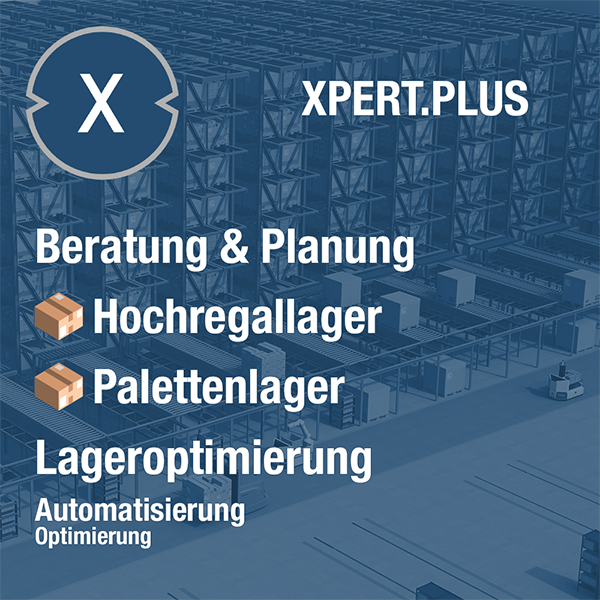
Xpert.Plus warehouse optimization - high-bay warehouses such as pallet warehouses consulting and planning
A new dimension of digital transformation with 'Managed AI' (Artificial Intelligence) - Platform & B2B Solution | Xpert Consulting

A new dimension of digital transformation with 'Managed AI' (Artificial Intelligence) – Platform & B2B Solution | Xpert Consulting - Image: Xpert.Digital
Here you will learn how your company can implement customized AI solutions quickly, securely, and without high entry barriers.
A Managed AI Platform is your all-round, worry-free package for artificial intelligence. Instead of dealing with complex technology, expensive infrastructure, and lengthy development processes, you receive a turnkey solution tailored to your needs from a specialized partner – often within a few days.
The key benefits at a glance:
⚡ Fast implementation: From idea to operational application in days, not months. We deliver practical solutions that create immediate value.
🔒 Maximum data security: Your sensitive data remains with you. We guarantee secure and compliant processing without sharing data with third parties.
💸 No financial risk: You only pay for results. High upfront investments in hardware, software, or personnel are completely eliminated.
🎯 Focus on your core business: Concentrate on what you do best. We handle the entire technical implementation, operation, and maintenance of your AI solution.
📈 Future-proof & Scalable: Your AI grows with you. We ensure ongoing optimization and scalability, and flexibly adapt the models to new requirements.
More about it here:
We are there for you - advice - planning - implementation - project management
☑️ SME support in strategy, consulting, planning and implementation
☑️ Creation or realignment of the digital strategy and digitalization
☑️ Expansion and optimization of international sales processes
☑️ Global & Digital B2B trading platforms
☑️ Pioneer Business Development
I would be happy to serve as your personal advisor.
You can contact me by filling out the contact form below or simply call me on +49 89 89 674 804 (Munich) .
I'm looking forward to our joint project.
Xpert.Digital - Konrad Wolfenstein
Xpert.Digital is a hub for industry with a focus on digitalization, mechanical engineering, logistics/intralogistics and photovoltaics.
With our 360° business development solution, we support well-known companies from new business to after sales.
Market intelligence, smarketing, marketing automation, content development, PR, mail campaigns, personalized social media and lead nurturing are part of our digital tools.
You can find out more at: www.xpert.digital - www.xpert.solar - www.xpert.plus










